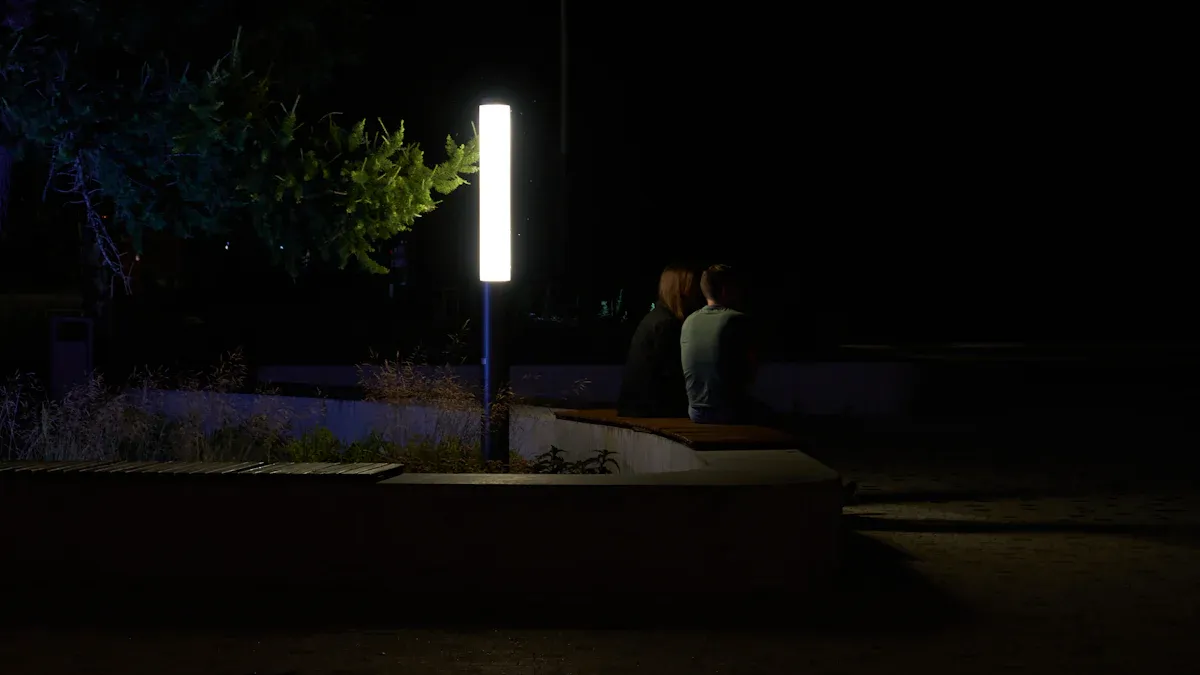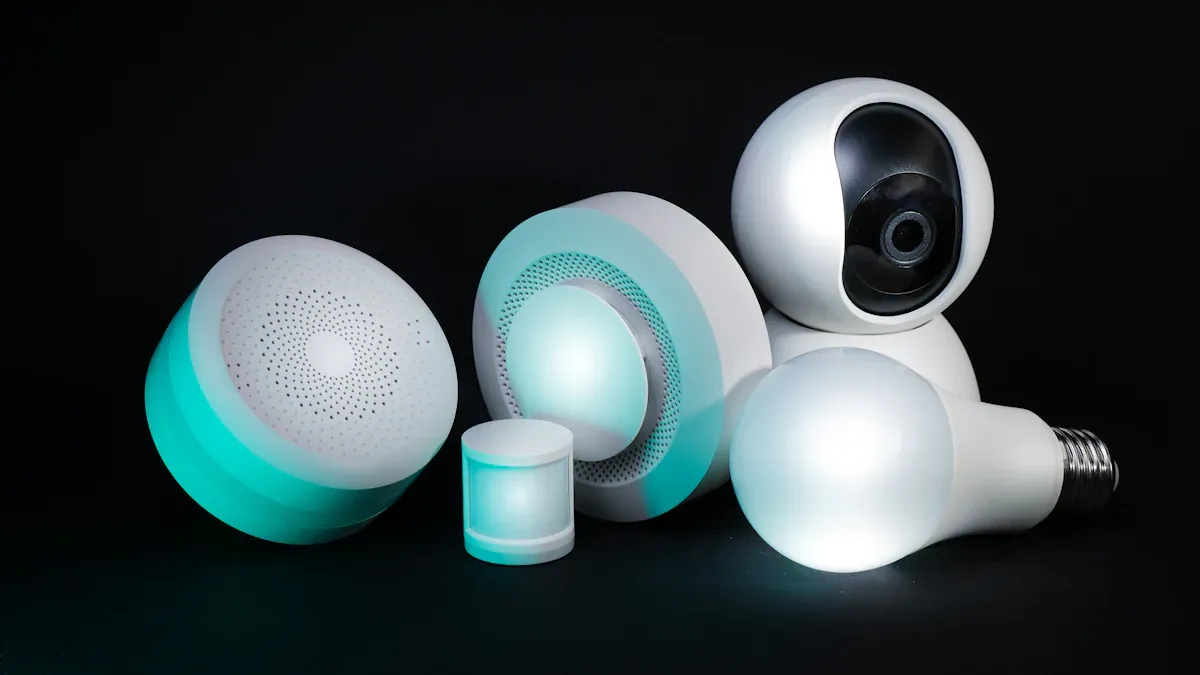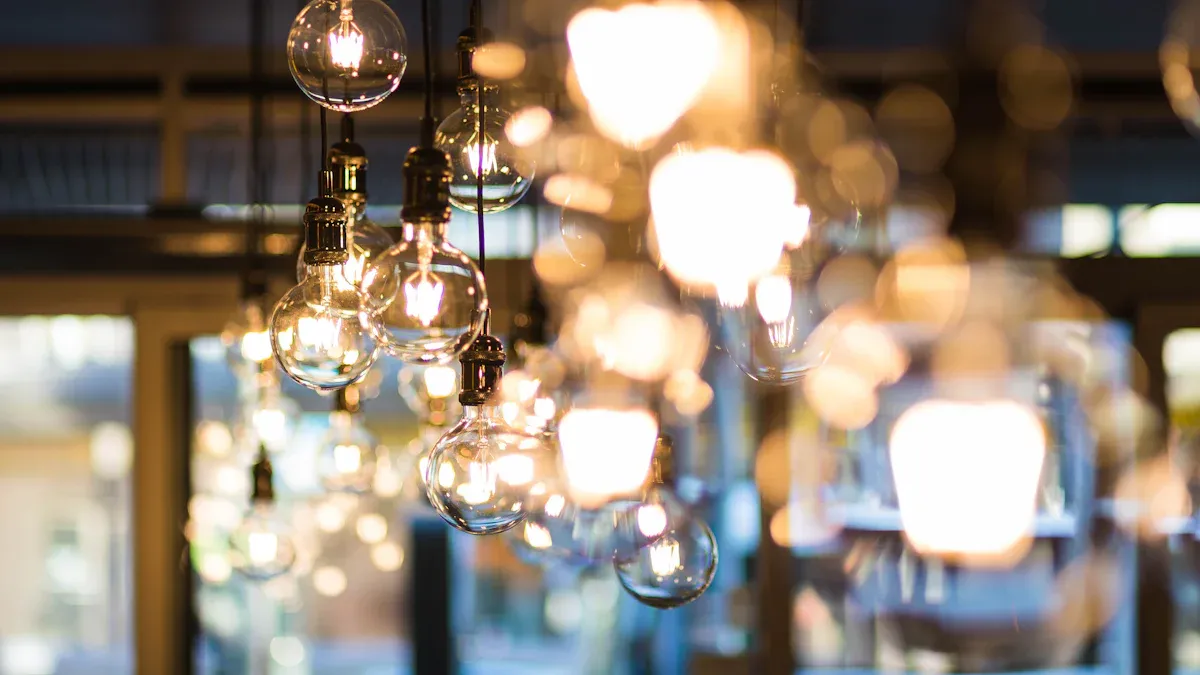Commercial Outside Lighting Trends for 2025

Commercial outside lighting in 2025 focuses on smart controls, solar power, and layered lighting design. Businesses pick smart lighting systems with IoT features, motion sensors, and changing brightness. These help make places safer, save energy, and look better.
Key trends are:
Energy-saving Led Light and solar-powered options for being green
New lighting design that mixes people-friendly and fancy styles
More money spent on smart, modular lighting for business places
Focus on earth-friendly materials and UV-C modules for safe spaces
Lighting choices now affect business results, from About Us pages to Home and Product displays.
Key Takeaways
Smart commercial lighting has sensors and uses IoT. This helps save energy and makes places safer. People can also control the lights from far away.
LED and solar-powered lights cost less to use. They last a long time and are good for the environment.
Layered and custom lighting designs make outdoor areas look nice. These designs also help show off a business’s brand.
Strong, weatherproof materials and low-maintenance LEDs are used. This means fewer repairs and lights last longer.
Good lighting makes places safer and cuts down on light pollution. It also helps workers stay healthy and work better.
Smart Commercial Outside Lighting

Automated Controls
Smart commercial lighting uses automated controls for saving energy and making things easier. These systems have sensors and timers that change lights when needed. For example, daylight harvesting lets lights get brighter or dimmer with sunlight. This helps save energy and keeps people comfortable. Some buildings show that using these controls can cut energy use by 30%. This saves money and helps the planet. Automated controls also make lighting better, help people’s sleep cycles, and stop too much light outside. Businesses like these systems because they use less energy and work with green power.
IoT Integration
IoT integration is now common in smart commercial lighting. Devices and sensors talk to each other through one main system. This lets managers check and change lights from far away. Smart lighting uses data to know when to fix things and when to turn lights on or off. This helps lights change with the weather or how many people are there. IoT lighting helps businesses save energy and makes things nicer for people. IoT also helps with daylight harvesting and changing light schedules, so lighting is smarter and better for the earth.
Occupancy Sensors
Occupancy sensors are important in smart commercial lighting. These sensors see movement and change the lights by themselves. If no one is there, the lights get dim or turn off to save power. Some sensors can also see how much sunlight is in the room. This means lights only turn on when needed, so less electricity is used. This also helps stop pollution. Using occupancy sensors with daylight harvesting makes lighting in business places work well and easy for everyone.
Energy Efficiency Trends
LED Technology
In 2025, commercial outside lighting uses advanced led technology. This makes lights work better and cost less. Businesses pick leds instead of fluorescent lights. Leds save more energy and do not have dangerous chemicals. Many places like schools and city streets use leds. They last a long time and work well.
Network lighting controls (NLCs) let managers control all lights from one spot. This helps save energy and money.
Businesses can pick tunable white and RGB leds to set the mood.
Dynamic led systems change color and brightness for safety and looks.
Small leds fit in many designs. This makes lights hard to see but still bright.
Human-centric lighting uses leds to copy natural light. This helps people feel good and work better.
Smart led technology helps the planet by using less power and lasting longer than old lights.
Solar-Powered Fixtures
Solar-powered lighting is now very popular for businesses. These lights use solar panels and strong batteries. They store energy during the day and light up at night. The table below shows how solar-powered fixtures and traditional lighting are different:
Aspect | Solar-Powered Fixtures | Traditional Lighting (Incandescent) |
|---|---|---|
Brightness (Lumens) | Similar high-performance systems | |
Energy Efficiency | Over 200 lumens per watt | About 17 lumens per watt |
Battery Technologies | Lithium-ion, Flow, Graphene-based, Solid-state | N/A |
Installation & Maintenance | Wireless, low maintenance | Wired, higher maintenance |
Applications | Streets, parking lots, off-grid areas | Needs grid power |
Durability | Weather-resistant materials | Often less weather-resistant |
Solar-powered lights use less electricity and cost less over time. New batteries and panels make these lights work even when it is cloudy. Many cities and companies use solar lights to help the earth and save money.
Eco-Friendly Materials
Now, companies use eco-friendly and sustainable materials for outside lighting.
Fixtures often have recycled or recyclable parts. This helps cut down on waste.
Companies do not use dangerous things like lead and mercury. This makes lights safer for people and nature.
Using leds and solar-powered lights means less energy use and fewer emissions.
Many lights meet Energy Star and RoHS rules. This shows they care about the planet.
Picking lights with green materials saves energy, makes products last longer, and keeps the earth clean.
Human-Centric Lighting
Health Impact
Human-centric lighting helps people stay healthy outside. These lights can change how bright and what color they are. They try to match the sun’s natural light. This helps control our sleep and how awake we feel. People who get sunlight or lights like sunlight feel happier and sleep longer. Good lighting can stop eyes from hurting and help with headaches. Outdoor places with these lights are safer and more comfortable for everyone.
Productivity
Lighting is important for how well people work. Studies show that workers with sunlight or sunlight-like lights feel more awake and make fewer mistakes. Cool color lights, like 6500K, help people type faster and mess up less. Bad lighting can hurt your eyes, give you headaches, and make your body hurt. This makes people work slower. In factories, better lighting made people work 10% faster and make 30% fewer mistakes. The Lighting Research Center says lights that help our sleep cycles give us more energy and help us focus. Night workers feel better and do their jobs better with lights that act like the sun.
Sunlight helps people feel better, sleep better, and think better.
Lights like sunlight make people more awake and careful.
Cool color lights help people work faster and better.
Bad lighting makes people feel bad and work less.
Smart lighting keeps people working well outside.
Warm and Cool Color Temperatures
Picking the right color light makes outdoor places nicer and easier to see. Warm white lights, about 2700K, are good for doors and make people feel welcome. Gardens use warm or natural white, like 3000K, to show off plants. Cool white lights, from 4000K to 4200K, look like moonlight and help people see details. Security lights use 4600K to 6500K to keep places safe. Warm lights under 3000K feel like sunrise and are good for animals. Cool lights, from 4000K to 6500K, help people see in parking lots and at bus stops. Using both warm and cool lights keeps places safe, comfy, and nice to look at.
Design and Aesthetic Trends

Layered Lighting
Layered lighting is a big trend for outdoor business spaces in 2025. This style uses different lights to make places look interesting and deep.
Ambient lighting lights up big areas like parking lots and walkways.
Accent lighting shines on buildings, trees, or signs to make them stand out.
Task lighting helps people see better at doors, stairs, and seats.
These lighting styles have many good points:
They save energy by using LED and solar-powered lights.
They make places safer with smart controls and motion sensors.
They make spaces look fancy and friendly.
They help businesses get noticed with special lighting designs.
Layered lighting helps businesses make outdoor spaces that are safe, flexible, and nice to look at.
Ground and Recessed Lighting
Ground and recessed lights are now popular in new lighting designs. These lights sit flat on the ground and make the area look smooth. They show off plants and buildings.
These lights give soft light without hurting your eyes, so outdoor spaces feel cozy.
They help people walk safely by lighting up dark spots and paths.
Using LED and solar-powered lights saves money and helps the earth.
Stores and other businesses use these lights to make places look better and safer.
Cleaning and checking these lights often keeps them working well. Smart controls let you dim the lights or change colors, so you can change how the place looks.
Vintage and Minimalist Styles
In 2025, many places use vintage and minimalist lighting styles.
Minimalist lighting uses simple shapes and hidden lights, like thin hanging lights and flat LEDs. This style matches modern buildings and looks neat.
Vintage lighting uses old-style touches, like brass and round bulbs, but with new LED lights. This keeps the old look but saves energy and adds smart features.
Both styles are good for hotels, shops, and old buildings. Designers use layers of light and focus on important spots to make the mood nice and stop too much light.
Statement Fixtures
Statement fixtures are important for how people see a business. Chandeliers, floodlights, and bollard lights are some examples. Chandeliers in hotel lobbies or fancy restaurants make the place feel grand and special. Floodlights shine on buildings and keep places safe, showing that safety matters. Bollard lights light up paths and make outdoor areas look stylish and welcoming.
Typical Commercial Use | Influence on Brand Perception | |
|---|---|---|
Chandeliers | Hotel lobbies, banquet halls, restaurants | Show elegance and a modern feel; make the place feel special |
Floodlights | Parking lots, building exteriors, industries | Make places safer; show off buildings; look professional |
Bollard Lights | Gardens, driveways, walkways | Light up paths; add style; make spaces feel friendly |
Today’s statement fixtures look nice and use smart, earth-friendly technology. They help businesses show what they care about and make a strong first impression.
Durability and Longevity
Weatherproofing
Commercial outside lighting needs to work in all weather. Many businesses pick fixtures with high IP ratings, like IP65 or more, to block dust and water. In places with lots of rain, IP67 or IP68 fixtures give even better protection. Companies use materials like aluminum, brass, copper, or stainless steel. These do not rust and last longer in salty or wet air. Powder-coated finishes also help stop rust and damage.
Sealed designs with weather-resistant gaskets and special coatings keep out water, UV rays, and salt.
Different seasons need different care:
Summer: Heat-resistant and UV-resistant finishes stop lights from fading or bending.
Winter: Strong, snow-resistant fixtures with sealed covers handle ice and frost.
Rainy times: Damp-rated fixtures and good sealing keep water away.
Cleaning the lenses and checking the seals often helps lights last longer. Smart lighting can change how bright lights are and when they turn on, depending on the season. This saves energy and helps lights last longer.
Advanced Materials
Manufacturers use strong materials to make lights last longer. Many fixtures use high-quality aluminum for the main part. Heat sinks move heat away from the led parts. This keeps them cool and working well. Some fixtures have shock-resistant and weatherproof covers. These features help lights work well even in tough weather. Over time, these materials mean fewer repairs and replacements.
Maintenance
Modern commercial outside lighting, like led fixtures, needs less care than old lights. LEDs last longer and do not break easily in bad weather. This means property managers save time and money. These lights almost never need to be replaced and keep working in harsh weather. Old lights need new bulbs and repairs more often. By using modern led lighting, businesses can make things easier and spend less on fixing lights.
Commercial Lighting for Business
Cost Savings
Businesses save a lot of money with new lighting. LED fixtures use much less energy than old lights. They can cut energy use by up to 75%. LEDs last a long time, from 25,000 to 100,000 hours. This means companies do not have to buy new lights often. They also spend less on fixing broken lights. Upgrading lights usually costs between $3,000 and $10,000. The price depends on how big the place is and what lights are picked. Utility companies sometimes give rebates or rewards for using better lights. These help lower the first cost. Lower power bills and less fixing means businesses keep more money.
Tip: Using energy-saving lights helps companies save money each month and keeps their budgets healthy for a long time.
Custom Solutions
Every business needs different lighting. Custom lighting plans help meet these needs. Designers use special computer programs to plan the lights. They make sure the lights fit the building and outdoor areas. Companies can use lights to show off special parts of their buildings. Security lighting helps keep people and things safe. Lights on paths and in gardens help people see and make places look nice. Smart controls let managers change how bright the lights are or what color they show. They can also set lights for parties or holidays. LED and solar-powered lights are good for the earth.
Accent lighting makes important parts stand out.
Security lighting keeps people and things safe.
Path and garden lights help people see and make places pretty.
Holiday lights make places look fun all year.
Custom lighting helps businesses look good, stay safe, and save energy.
ROI
Business owners care about getting their money back. Modern lighting helps them do this. New lights save energy and need less fixing. LEDs last a long time, so lights do not need to be changed often. Utility rebates and lower bills help businesses get their money back faster. Better lighting also makes places safer and nicer for customers. This can help businesses get a better name and make more money.
Benefit | Impact on ROI |
|---|---|
Energy savings | Lower running costs |
Fewer replacements | Less money spent on repairs |
Utility incentives | Get money back sooner |
Improved safety | Fewer chances of accidents |
Smart lighting choices help businesses save money fast and keep saving for years.
Dark Sky and Safety
Light Pollution Reduction
Commercial outside lighting in 2025 must help stop light pollution. Businesses use many ways to keep the night sky dark and safe for nature.
LED lights with focused beams keep light from going where it is not wanted.
Shades and covers point light down, so it only shines where people need it.
Using fewer lights and turning them off sooner keeps things less bright.
Decorative lights stay off most of the night to stop extra glare.
Dimmers, motion sensors, and timers help control when and how bright lights are.
Shields on lights stop glare and keep light away from neighbors.
Warmer color lights, under 5000K, help stop skyglow and glare.
Blinds or curtains inside stop indoor light from shining outside.
9. Wildlife-friendly lights, like amber ones, help protect animals in special places.
The International Dark-Sky Association gives rules to help businesses follow dark sky standards and make lighting better.
Security
Good lighting makes business areas safer. LED lights help people see better at doors, alleys, and parking lots. Wall packs and bollards take away shadows, so bad people cannot hide. Parking lot and driveway lights keep cars and people safe from accidents. Bright areas help security cameras work and let stores stay open longer. LED lights work well with motion sensors, so safety costs less. In Newark, New Jersey, new LED streetlights in busy areas helped lower crime and made people feel safer. Putting lights in the right spots, like doors and walkways, keeps everyone safe.
Outdoor Usability
Lighting in busy places must help people use the space. Even lighting stops shadows and helps people see well. Smart lights change brightness when more people are around, making places safer and nicer. LED and solar-powered lights save energy and last a long time. Strong materials, like metals that do not rust and covers that do not break, keep lights working in bad weather. Putting lights in the right places and using the right brightness helps people see on paths and stairs. Cool white lights help people stay awake, and warm lights make places feel friendly. Nice-looking lights match the building and help show the business brand. Following safety rules and stopping light pollution also make outdoor spaces better for everyone.
Commercial outside lighting in 2025 pushes businesses to use smart systems. These systems help save energy, keep people safe, and make places look nice. Companies get many good things from these lights. They use less power, need less fixing, and make people feel happy. Using LED, solar, and smart controls gives flexible lighting for the future.
Experts should learn about new lighting technology and design ideas. This helps them work better and meet new project needs.
Benefit | Impact |
|---|---|
Lower costs, higher ROI | |
Improved security, fewer risks | |
Aesthetics | Stronger brand appeal |
Sustainability | Environmental responsibility |
FAQ
What are the main benefits of smart commercial outside lighting?
Smart lighting helps businesses use less energy. This saves money for the company. It also makes places safer for everyone. People can control the lights from far away. Smart lighting is good for the earth. Many companies pick smart lighting because it works well and is easy to use.
How do solar-powered fixtures perform in cloudy weather?
Solar-powered fixtures have strong batteries. These batteries save extra power on sunny days. The lights still work when it is cloudy outside. Many businesses use solar fixtures because they give steady light all year.
Can businesses customize outside lighting designs?
Yes, businesses can get custom lighting plans. Designers use computer programs to make the best layout. Companies can pick the color, how bright the lights are, and the style. Custom lighting helps brands look special and keeps places safe.
Do LED lights require frequent maintenance?
LED lights last much longer than old bulbs. They do not break easily in bad weather. Most businesses do not need to fix or change them often. This means less money spent on repairs and lights stay bright outside.
How does outside lighting help reduce light pollution?
Special beams, shields, and timers keep light in the right place. Warm color lights and smart controls stop glare. These things help keep the night sky dark and follow dark sky rules.
See Also
Commercial Outdoor Lighting Options For Safety And Style
Top Five LED Outdoor Lights To Enhance Home Security
Outdoor Sign Lighting: Varieties, Uses, And Expert Tips

